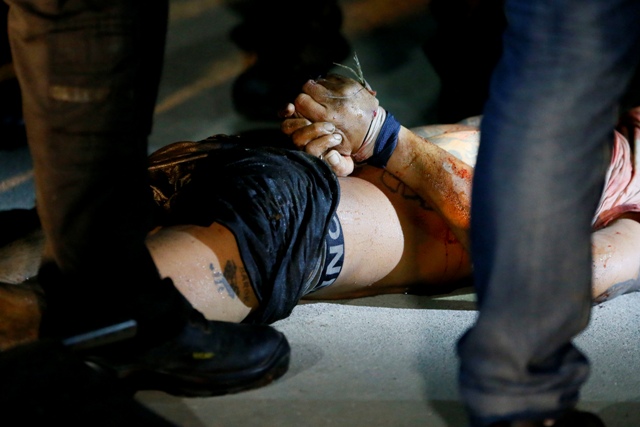CHR to probe Duterte killings

The new fact-finding investigation on the so-called Davao death squad (DDS) will look into all available leads, including the recent admission of President Duterte that he killed people when he was still mayor of Davao City, the Commission on Human Rights (CHR) said yesterday. AP/Bullit Marquez
MANILA, Philippines – This time, no stone will be left unturned.
The new fact-finding investigation on the so-called Davao death squad (DDS) will look into all available leads, including the recent admission of President Duterte that he killed people when he was still mayor of Davao City, the Commission on Human Rights (CHR) said yesterday.
Responding to a call of United Nations High Commissioner for Human Rights Zeid Ra’ad Al Hussein for Philippine authorities to investigate the killings supposedly committed by Duterte, CHR chairman Chito Gascon said the matter would be taken into account in the ongoing probe of the alleged vigilante group tied to the Chief Executive.
“CHR has reconstituted a team to further investigate DDS to look into new revelations and public admissions that may shed light on our previous findings,” Gascon told The STAR.
“The team will look into any matter that may further shed light on the killings in Davao that was the subject matter of our previous investigation,” Gascon said.
In a statement on Tuesday, Hussein said Philippine judicial authorities should launch a murder investigation to demonstrate their commitment in upholding the rule of law and their independence from the executive.
“The killings committed by Mr. Duterte, by his own admission, at a time when he was a mayor, clearly constitute murder. It should be unthinkable for any functioning judicial system not to launch investigative and judicial proceedings when someone has openly admitted being a killer,” Hussein said.
Gascon agreed, saying law enforcement agencies such as the police, the National Bureau of Investigation, the ombudsman and the prosecutors under the Department of Justice must investigate any information suggesting that a crime has been committed.
“The UN High Commissioner for Human Rights is as concerned as all of us should be when public statements by high officials suggest the possibility of wrongdoing having occurred,” Gascon said.
“He is making this call to ensure that all state members of the UN adhere to the rule of law and deliver justice for all,” he added.
Without prosecutorial powers, the CHR is limited to conducting fact-finding investigations, with the results mainly recommendatory in nature.
New DDS probe
Gascon said the new investigation on the DDS was reopened earlier this year based on the pronouncements made by Duterte, then a presidential candidate, on how he addressed criminality in his city.
“They went to Davao early this year. But, to be direct about it, they informed me on their return from there that they found difficulty uncovering new evidence and so standing instructions were to keep the case open nonetheless,” said the CHR chief.
“Then, much later, Mr. Matobato surfaced at the Senate,” he added, referring to the self-confessed hit man Edgar Matobato, who was presented during one of the Senate investigations on alleged extrajudicial killings.
During the Senate hearing, Matobato claimed the existence of the DDS and that Duterte had personally ordered the killing of some suspected criminals.
Sen. Richard Gordon, who took over the Senate human rights and justice committee from Duterte’s critic Sen. Leila de Lima, had dismissed Matobato’s claims due to inconsistencies.
Gascon said all information should be properly examined and not immediately dismissed. He said their team has interviewed Matobato.
“It is important to continue following all leads to uncover the truth on DDS,” he said.
Like the CHR, the Office of the Ombudsman said it would reopen its probe on the DDS following a complaint filed by Matobato.
Overall Deputy Ombudsman Melchor Arthur Carandang said the investigation could still be reopened on the summary or arbitrary executions supposedly committed by the DDS.
“Yes, if there is evidence that will surface, the investigation on the DDS can still be reopened,” Carandang said.
The Office of the Ombudsman earlier conducted an investigation on the DDS based on a 2012 CHR resolution recommending a probe on the killing. Duterte was later cleared of the allegations.
Ties to Rody
The previous CHR investigation was launched in 2009 by De Lima, then the CHR chief. It covered 206 killings in Davao City from 2005 to 2009, many of whom have records or are suspected of committing illegal activities.
The resolution, released in 2012 under the leadership of Loretta Ann Rosales, found that there was a “systematic practice of extrajudicial killings” which can be attributed to the DDS.
“The Commission also found that there was a systematic failure on the part of the local officials to conduct any meaningful investigation into said killings, thereby violating the state’s obligation to protect the rights of its citizens,” Rosales said of their investigation.
“In particular, it found that then mayor Rodrigo Duterte, as the local chief executive and deputized (National Police Commission) representative with general and operational control and supervision over the city police force, had clearly disregarded information of alleged violation of the right to life committed in Davao City, and had not acted thereon,” she added.
The CHR recommended that the ombudsman investigate possible criminal and administrative liability of Duterte for inaction over the killings, as well as for other law enforcement agencies to constitute a task force to look into the killings. – With Jess Diaz
- Latest
- Trending




























